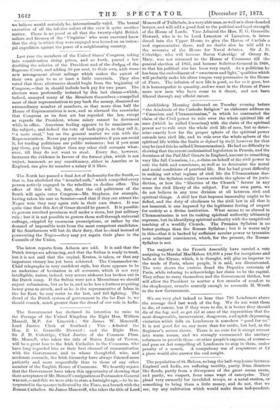Archbishop Manning delivered on Tuesday evening before "the Academia of
the Catholic Religion" an elaborate address on " Cresarism and Ultramontanism," in which he contrasted the claim of the Civil power to rule over the whole spiritual life of man (which he called Cmsarism) with the claim of the spiritual power not to rule over the whole civil life of man, but to deter- mine exactly how far the proper sphere of the spiritual power extends into civil life, and to rule over the whole sphere of the spiritual life within the limits so defined by itself, however far that maybe (and this he called Ultramontanism). He had no difficulty in showing that the recent ecclesiastical legislation in Prussia, and the doctrines of the Pall Mall Gazette in England, amount to something very like full Cwsarism, i.e., a claim on behalf of the civil power to- rule the faith and conscience, as well as to determine the moral and social conditions of practical life. But he had great difficulty in making out what regions of civil life the Ultramontane doc- trine of the Syllabus really leaves outside the sphere of its juris- diction, or how the "liberties of the Church" favour in any sense the civil liberty of the subject. For our own parts, we do not believe in any true division at all between civil and spiritual things. A civil law that imposes immorality ought to be defied, and the duty of obedience to the civil law in all that is not immoral, is one imposed by the legitimate feeling of respect for society as a divine institution. What seems to us absurd in Ultramontanism is not its making spiritual authority ultimately supreme, but its identifying spiritual authority with the unspiritual teaching of a worldly Church. The Pruesian Syllabus is no- better perhaps than the Roman Syllabus ; but it is worse only in this—that it is backed by sufficient secular power to tyrannise over reluctant consciences, which, for the present, the Roman Syllabus is not.


































 Previous page
Previous page